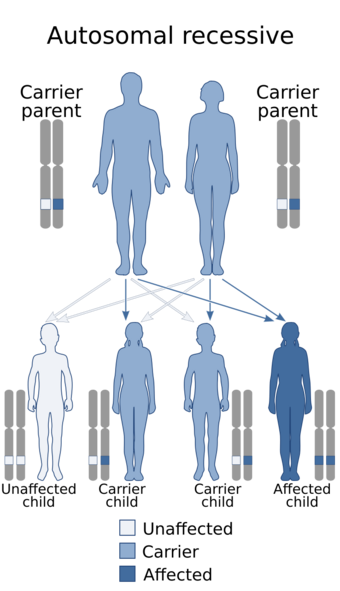Medicine:Hennekam syndrome
| Hennekam syndrome | |
|---|---|
| Other names | ennekam lymphangiectasia–lymphedema syndrome, intestinal lymphagiectasia–lymphedema–mental retardation syndrome[1] |
 | |
| Hennekam syndrome is inherited in an autosomal recessive manner | |
Hennekam syndrome also known as intestinal lymphagiectasia–lymphedema–mental retardation syndrome,[1] is an autosomal recessive disorder consisting of intestinal lymphangiectasia, facial anomalies, peripheral lymphedema, and mild to moderate levels of growth and intellectual disability.[1][2]
It is also known as "lymphedema-lymphangiectasia-mental retardation syndrome".[3]
Hennekam Syndrome is subdivided according to the causative genetic lesion, most (or all) of which are affecting the VEGF-C/VEGFR-3 signaling pathway:
The first recognition of a genetic association was with CCBE1, published by its namesake, Raoul Hennekam.[7] The molecular mechanism of the lymphedema phenotype in CCBE1-associated cases was identified as a diminished ability of the mutated CCBE1 to accelerate and focus the activation of the primary lymphangiogenic growth factor VEGF-C.[8] Mutations in the FAT4 gene had previously been only associated with van Maldergem syndrome, but the pathogenetic molecular mechanism and the function of FAT4 within lymphangiogenesis are still unknown.
References
- ↑ 1.0 1.1 1.2 Tadmouri GO (2005). "Hennekam lymphangiectasia–lymphedema syndrome" (PDF). Catalogue for Transmission Genetics in Arabs. Centre for Arab Genomic Studies. http://www.cags.org.ae/pdf/235510.pdf.
- ↑ Erkan T, Kutlu T, Çullu F (1998). "Syndrome de hennekamHennekam syndrome" (in French). Arch Pediatr 5 (12): 1344–6. doi:10.1016/S0929-693X(99)80054-2. PMID 9885742.
- ↑ "Lymphedema-lymphangiectasia-mental retardation (Hennekam) syndrome: a review". Am. J. Med. Genet. 112 (4): 412–21. November 2002. doi:10.1002/ajmg.10707. PMID 12376947.
- ↑ "Mutations in CCBE1 cause generalized lymph vessel dysplasia in humans". Nat. Genet. 41 (12): 1272–4. December 2009. doi:10.1038/ng.484. PMID 19935664.
- ↑ "Hennekam syndrome can be caused by FAT4 mutations and be allelic to Van Maldergem syndrome". Hum. Genet. 133 (9): 1161–7. June 2014. doi:10.1007/s00439-014-1456-y. PMID 24913602.
- ↑ Brouillard, Pascal; Dupont, Laura; Helaers, Raphael; Coulie, Richard; Tiller, George E.; Peeden, Joseph; Colige, Alain; Vikkula, Miikka (2017). "Loss of ADAMTS3 activity causes Hennekam lymphangiectasia-lymphedema syndrome 3". Hum. Mol. Genet. 26 (21): 4095–4104. doi:10.1093/hmg/ddx297. PMID 28985353.
- ↑ Hennekam, R. C. M.; Geerdink, R. A.; Hamel, B. C. J.; Hennekam, F. a. M.; Kraus, P.; Rammeloo, J. A.; Tillemans, A. a. W. (1989). "Autosomal recessive intestinal lymphangiectasia and lymphedema, with facial anomalies and mental retardation". American Journal of Medical Genetics 34 (4): 593–600. doi:10.1002/ajmg.1320340429. PMID 2624276.
- ↑ "CCBE1 Enhances Lymphangiogenesis via A Disintegrin and Metalloprotease With Thrombospondin Motifs-3–Mediated Vascular Endothelial Growth Factor-C Activation". Circulation 129 (19): 1962–71. February 2014. doi:10.1161/CIRCULATIONAHA.113.002779. PMID 24552833.
External links
| Classification | |
|---|---|
| External resources |
 |

